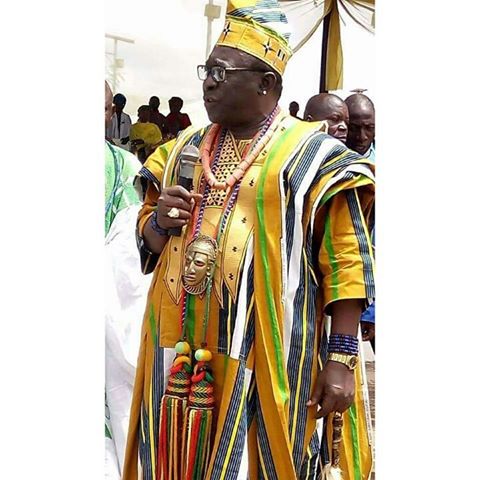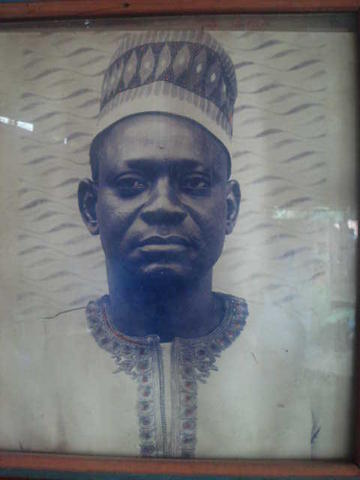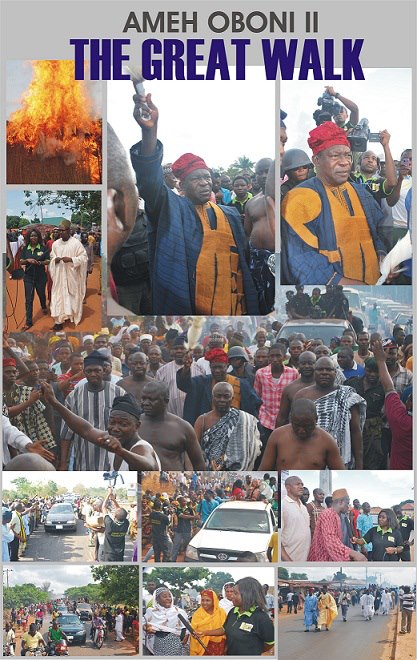
I want to express my most profound gratitude to the members of the National Executive Committee of the Igala Cultural Development Association (ICDA) for inviting me to speak at their maiden merit award winners’ ceremony. I count this as a real honour. I want to commend ICDA for the idea and spirit behind the merit award. As one world figure once said, “a nation is not great for the talents it has but for the talents it recognizes.” I hope this great idea will discourage the practice of PHD- ‘Pull Him Down’, for which our societies have been notorious over the last several decades. Against this background, it is truly remarkable that ICDA is honouring a number of our distinguished elders. It will be the beginning of great thing in Igala land, we can make faster progress along this line. We will have more people coming out to do things for the society without inhibitions.
We are assembled here today, as children and descendants of Ayegba Om’ Idoko (of blessed memory). From time to time we need to evoke the spirit of Ayegba as a source of inspiration, a balm to our soul, and a kind of feel-good recall of the past glories of the achievements of the Igala people. The circumstances the Igala man has found himself in, these days, demand that we evoke this same feeling for self-examination and re-awakening. We expected the modern-day nationhood to have taken us to the land of Canaan, according to the general wishes of Ayegba. Rather we are headed for the opposite direction. A review of social or poverty indicators (life expectancy, infant mortality, access to safe water, birth rate, death rate, illiteracy rate, etc.) in Igala land reveals a sad picture. Compared to the other parts of Kogi State, Igala land is probably the worst in terms of these problems. A terrible thing is happening in our land. People are aging faster and dying at faster rate than ever before. At a very recent public function, a community leader in Igala land was said to have listed the need for a working mortuary as high priority in his community. What a priority!
Culture
The objective of my paper is to put issues of culture and cultural identity to the forefront of the Igala public agenda. Failures and frustrated expectations of development have given rise to cultural tensions in many Igala communities. Elsewhere, we see successful development that not only close gap between rich and poor but also shows that tradition, specific to each culture, could be combined with the most modern economic, scientific and technological resources. Javier Perez de Cuellar, former Secretary General of the United Nations (UN) and currently Director-General of UN’s Commission on Culture and Development for the 21st Century, once observed “that development efforts had often failed because the importance of the human factor – that complex web of relationship and beliefs, values, and motivations, which lie at the very heart of culture – had been underestimated in many development projects.” The UN recognizes and endorses the diverse culture of the world as integral to the overall development of nations. ICDA’s invitation for me to speak at this occasion had given me the leeway to talk on any topic relating to culture. Their choice of focus can not be better.
Generally speaking, culture is conceptualized in two ways, which define its use. There is the materialistic or idealist concept on the one hand and the holistic or sectoral concept on the other hand. In the context of our discussion, (now and in the future) we will find both
concepts useful, with various limitations. The former looks at man’s direct interaction with the material environment, emphasizing the importance of the productive process, material life, tools and artifacts in the determination of value, idea, aesthetics, organizations and institutions. In addition, it emphasizes the spiritual element especially that composed in motivating ideas, a kind of collective conscience, and consciousness that gives meaning to situations and orientation to practical activity and the material environment. It imbues the processor with the necessity of ingredient self-esteem and authenticity. The latter concept, that is, the holistic or sectoral refers to the whole way of life of a people, concerned with leisure, the arts and crafts, religion, ceremonies, festivals, customs, and valuations and affecting economic and political orientation.
Chris Smith, British Secretary for Culture, describes culture as emotions, experiences and life-defining elements in all our lives that cannot be pinned down in mechanistic definitions, that cannot be counted by an accountant, that cannot be readily measured in a calculus, but that together form the most significant parts of our character, and our purpose in life. These elements form themselves into what we might call our own individual culture, our own sense of identity and self-worth. It can encompass the whole history of a people, on their current way of life, or their ideas for the future, or their religious beliefs or the corpus of their thought or their literature or their music or their art.
There are some aspects of culture that are retrogressive and unhelpful. For example with an ailment like malaria requires prompt treatment with medicine rather than blaming or accusing the mother or relations of practising witchcraft on the child.
However, there are very beneficial results that can come from traditional practices if properly integrated into the modern system. For example, there was the story of a man who broke an arm. He was taken to the General Hospital, but the staff of the hospital were on strike; he was then moved to a private clinic where there was no electricity to take X-ray pictures of the broken limb. Finally, he was taken to a traditional healer who cured him of his problem. Traditional medicine has been proven to be particularly efficacious in orthopaedics. This is certainly one area where modern medicine can collaborate with traditional medicine, instead of a wholesale rejection of the latter.
To a large extent public discussions and findings in the development world have focussed extensively on the linkage between economic and political autonomy and culture. The UN’s world commission on culture and development has this to say:
Human Development . . . refers to the individual human being, who is both the ultimate objective of development and one of the most important instruments or means to it. For an alert, skilled, educated, well nourished, healthy, well-motivated labour force is the most productive asset of a society. People, however are not self-contained atoms, they work together, cooperate, compete and interact in many ways. It is culture that connects them with one another and makes the development of the individual possible. Similarly, it is culture that defines how people relate to nature and their physical environment; to the earth and to the cosmos, and through which we express our attitude to and beliefs in other forms of life, both animal and plant. It is in this sense that all forms of development ultimately are determined by cultural factors. Indeed, from this point of view it is meaningless to talk of the ‘relation between culture and development’ as if they were two separate concepts, since development and the economy are part of or an aspect of a people’s culture. Culture then is not a means to material progress: It is the end and aim of ‘development’ such as the flourishing of human existence in all its forms and as a whole.
Ayegba Om’ Idoko wished his descendants good living standards. He left a legacy of a good central administration, stable society and good economy. The Igalas had their own food, farming system, food processing methods, cloth weaving, medicine and treatment of ailments, marriage systems, etc. These gave them their own identity. Experts in traditional technologies from other ethnic communities were lured by the old Attahs to Igala land so that the Igala people could benefit from their exotic technologies. This partially explains the existence of Igalas of some other ethnic extraction, for example Hausa and Nupe. Igala’s own institutions and culture, through an immensely long history, had taught its people how to provide public service. Meritocracy was a recognised way of advancement in society. Only the best hunters led their colleagues. All these gave the Igala people the confident sense of possessing and exercising a real control over their own lives. Ayegba’s descendants grew to be the nineth largest tribe of Nigeria (1963 census) with communities of Igala origin found in states like Enugu, Edo, Anambra, Delta and distant relatives in Taraba, Adamawa, Benue, Plateau, Niger, and Nassarawa. Ayegba’s system worked.
Cultural Decay
Looking at the Igala land today you observe a number of depressing symptoms of societal decay. You will observe a general lawlessness through out the culture. There is a loss of economic discipline and self- restraint. You will see tedious bureaucracy and the ineffectiveness of government due to over- centralization; top-heavy system of administration, lack of moral judgement, promotion of the wrong people and unnecessary extravagance. A decline in the quality of education is very apparent. We see a weakening of cultural foundation that contributed to the greatness of the people and loss of respect for tradition. There is a loss of respect for established religions and an increase in materialism, with primitive capital accumulation. Important spiritual indicators of this decay indicate a rise in immorality, the lure of alien gods and a lack of respect for human life.
The problem of our youth demands special mention. The youth represents our future. We can get a glimpse of our future from the present state of affairs concerning them. Dr. Mahathir Muhammed, prime minister of Malaysia has this concern, “we can easily achieve material progress by physical planning and development. But the stark truth is that the material wealth that we accumulated can be completely wiped out if we do not have the morally right set of values among the people who manage it”.
Our youth today are ill prepared, with their inadequate education, with mindset very wrong, misplaced values, disorientated attitudes, unrealistic expectations, and lack of job opportunities, all these culminating in intense frustration expressed both at home and on the street. They are a product of our “new societies” A few have motorcycles and use them to generate some money. In the next ten to twenty years they would not have the energy and other things required to ride the motorcycles. They will have no job experience or skills to rely on. Then we will face the real cyclic and devastating social crises. This is a time-bomb. The hopelessness of the situation is felt more when we realize that our last well- trained people are now in their fifties.
What went wrong
Basil Davidson in his invaluable book The Black Man’s Burden: Africa and the Curse of the Nation-State offers an explanation for Africa’s problems. Modern-day Africa neglected its culture in its development plans. Africa did not have the social structure required to benefit from the modern day nation-hood. This gave rise to the various ills of our society – corruption, nepotism, abuse of power etc. The experience of pre-colonial Africa was ignored. With very few exceptions, no peasant societies were studied to identify development potentials. In fact no such potentials were thought to exist in the African peasant societies. Just like in the rest of Africa, no studies to identify development potentials were carried out in Igala land. We seemed to be contented with being copycats.
The Way forward
There was no doubt that pre-colonial Igala communities made progress in their development efforts. Ralph Emerson would have advised the Igala people at independence, “insist on yourself, never imitate”. The words of Henry David Thoreau in this regard is instructive -‘we cannot lay foundations of our houses on the ashes of another civilization’. The Eastern Asian Japan, Malaysia Singapore, etc) followed the advice of Emerson and Thoreau, they insisted upon being themselves first and foremost. They returned, in cause and effect terms, to the education that was rooted in their own culture. This has been yielding for them economic, social, cultural and technological dividends, which the Westerners have now learnt to respect. The Chinese for example, returned to Chinese medicine and literature. National classics and Buddhism were introduced.
While retaining their cultures, they accepted the inevitability of science and technology, and the change of life they bring. They kept their important personal values – hardwork, respect for others, honesty, self-discipline and self-reliance. They kept their important societal values – orderly society, harmony, accountability of public officials, and respect for law and order. In the Chinese society, the interest of the community is superior to individual rights.
The Igala man’s burden
The Igala man’s burden is how to move forward without losing his Igalaness; how to modernize without being Westernized. It is in fact, a task which faces all Nigerian peoples. We have the task of looking at the potentials of development of the past, so that we can bring them alongside modern science and technology. We have to rediscover ourselves, look for the old medicinal trees, re-establish the family values that ensured public accountability, prevent abuse of the society – all essential to development. This will call for re-examination of our tradition institutions with a view to empower them for further development of our culture. The rural people, also as custodians of our culture, will need to be similarly empowered. The new leadership of the Igalas must shift emphasis from developing only some physical elements and build the people. Physical infrastructure must be developed, but not at the expense of the people. I am referring to the practice of building houses and not the people, rehabilitating the school building not paying staff salaries and encouraging people to depend on state patronage and handouts, instead of giving them the initiative to develop their own livelihood.
There should be a major effort in developing our economy along the cultural experience. For example, the woman processing palm oil or weaving cloth should be assisted to be better in her occupation. The farmers, fishermen, tailors, carpenters, etc should be similarly assisted. Development initiatives must shift in favour of the rural areas in other to produce balanced progress.
Renewed emphasis on all forms of education is key to lightening the Igala man’s burden. We should have a cultural philosophy in the State University, as a good starting point. Through the state traditional council we should encourage a state-wide renaissance (Igala renaissance, Okun renaissance, Koto renaissance, Ogori renaissance, Bassa Nge renaissance, etc.). Community-based organizations, hometown associations and their women wings will need to refocus interest in their special contributions to the wider Igala culture. These should be worked into each other to produce a ‘confluence renaissance’, using a strong department of sociology and anthropology at the state university. The university will need to strengthen its pure sciences, pure arts and philosophy courses as priority. This will enhance basic research work which is essential for development
As individuals, our respective attitudes can make or mar the lightening of the burden. We must resolve to make the change as individuals and at family levels, to uphold values which advance societies – focus on merit, hard-work, honesty, fairness, etc. we will need to rededicate ourselves to the ideals for which Inikpi sacrificed herself.
Conclusion
The Igala man’s burden is essentially cultural. It has been made heavier as a result of neglect of the Igala culture and failures of development initiatives which were imports of non- African scenarios and solutions. The Igala leadership failed woefully to establish vital links with the poor and dispossessed of the land. Participatory leadership, participatory politics and participatory development are a necessity in our new initiative. The various youth associations (e.g Igala Student Association) must be empowered to participate in the resolution of youth problems in Igala land. An empowered traditional institution and rural populace have special roles to play. The state university appropriately staffed will lead the cultural and philosophical battle. ICDA has taken the lead by establishing its consultative forum and encouraging this particular discussion today.
By Dr. Emmanuel Onucheyo


